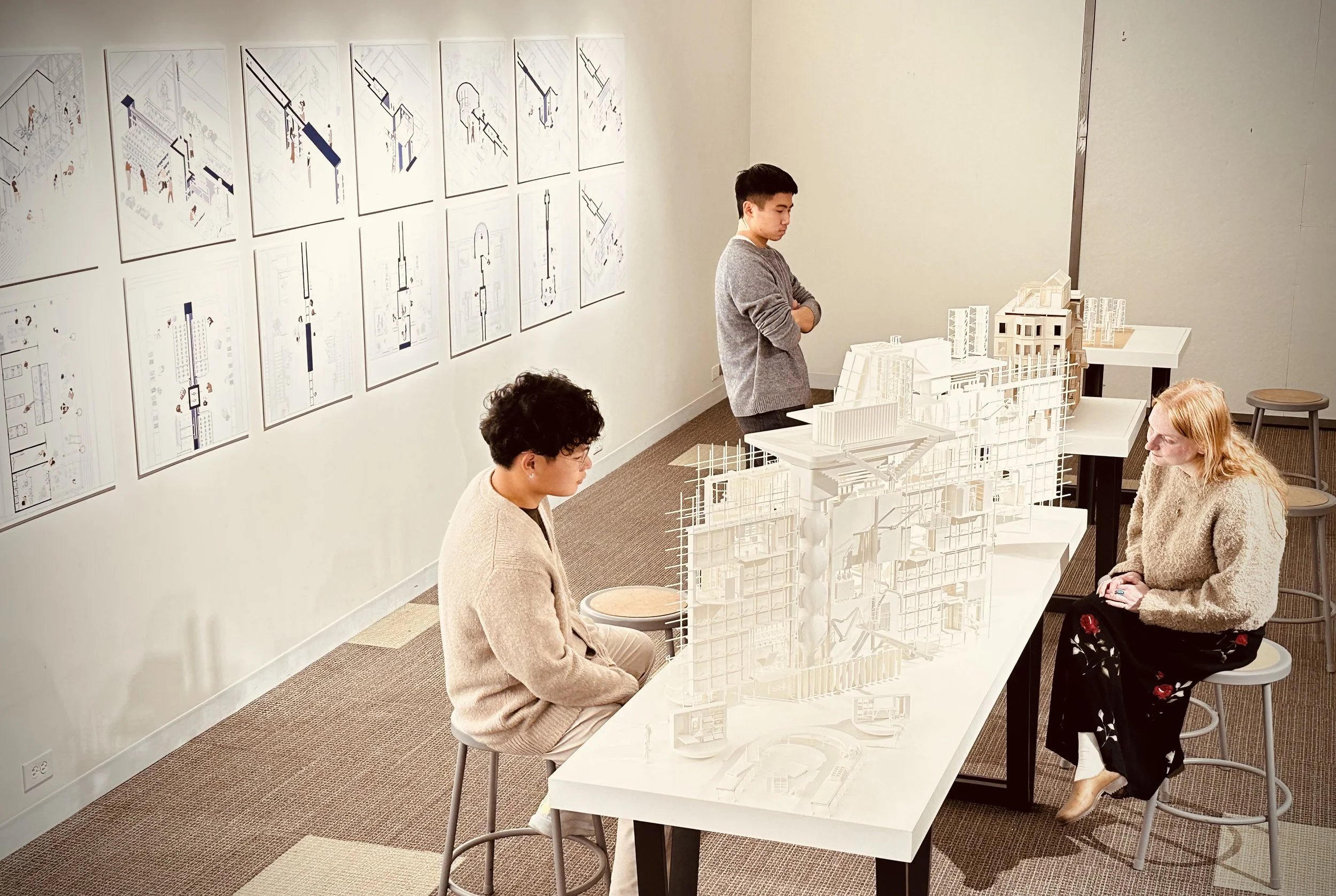A new exhibition by architect and urban designer Petra Kempf at Kent State University’s Cleveland Urban Design Collaborative
1309 Euclid Avenue, Suite 200 | Cleveland, Ohio 44115 | 216.357.3426 | cudc.kent.edu
Opening reception and gallery talk: October 24, 2024 from 5:30-7pm
Gallery hours:
Monday – Friday from 9am - 4pm from October 25 through November 25, 2024 and Saturday, November 2, 2024 from 10am – 2pm.
Free and open to the public.
Imagine you live in a house
where sharing space, kitchen appliances, or knowledge is not based on transactions, but care.
Imagine a door opens to a mini house providing a caregiver from abroad,
a single parent, or a student from another city access to a different life.
Imagine a place where children and the elderly are an integral part of a community.
Imagine a diverse group of people sitting at a table and everyone is part of the conversation.
Imagine a house where the world gathers This is the idea behind Party Wall Common.
The subdivision of land into private property plays a crucial role in shaping a society’s coexistence. This condition is particularly apparent in an urban environment, where the grid has become a facilitator of the right to own land, enabling humans to abstract their relationship to one another and the environment they inhabit. The resulting degradation of land and the rising intensities of weather patterns have compelled a recognition of the link between the exploitation of resources and the concept of ownership. Hence, the monetization of resources, as well as the wasteful consumption of synthetic and organic matter, suggest the actual limits of this type of thinking. In light of these ecological and societal circumstances, there is a pressing need to rethink existing systems of ownership.
This exhibition examines the concept of ownership, as well as the challenges pertaining to our disconnection from one another and our environment, by exploring the legal and spatial conversion of party walls typical of row house typology into a common ground. In such a common ground, neither the public nor the private “governs”; rather, a multitude of interactions generated by a collective body embracing a field of changing configurations, by which the duality of “I” versus “THEY” is permeated by a third entity: the “WE”. The notion of “we” is the legal and spatial materialization of a common ground in which a collective embraces a form of ownership that is devoid of exploitation and is committed for the long term, that centers around social equity and care for the environment, while sharing both material and immaterial resources. Inhabiting the Party Wall Common enables this transformation to happen.
Architect and urban designer, Petra Kempf
Petra Kempf, Ph.D., is an assistant professor at the Sam Fox School of Design and Visual Arts at Washington University in St. Louis. She is an architect, urban designer, and educator. Her creative practice and research speculate on how the assemblage of collective living has been influenced by urbanization. Within these parameters, her investigations are centered on regenerative ways of living, based on reflective, responsive, and reciprocal relationships, to confront the pressing challenges to the environment as well as the changing life parameters of urban citizens living in an urban environment today. As part of this research, Kempf introduced the methodology of game making into the pedagogy at the Sam Fox School as an emerging syntax in the exploration and approach to urban life.
Kempf has worked at institutions within the public and private sector, including the New York City Department of City Planning, the Project for Public Spaces, and Richard Meier & Partners. She has taught at schools throughout the U.S. and Europe, including the Rhode Island School of Design, Columbia University, Cornell University, Parsons School of Design, Pratt Institute, and the University of Dortmund, Germany. She earned a DAAD (German Academic Exchange Service) Fellowship, the Architectural League of New York’s Young Architect Award, and grants from the Graham Foundation for Advanced Studies in the Fine Arts and the Mellon Foundation. She is the founder of Confront(ing) Urbanization, an interdisciplinary research initiative with focus on how the assemblage of collective living has been influenced by urbanization.
Her work has been exhibited at venues such as Architecture Venice Biennale and Chicago Biennale, the Carnegie Museum of Art in Pittsburgh, Pink Comma Gallery in Boston, and Roca Gallery in London, among other galleries and academic institutions in the U.S. and Europe, such as Cornell University and Rhode Island School of Design. She has published a series of articles and is the author of “You are the City” and “(K)ein Ort Nirgends, Der Transitraum im urbanen Netzwerk.”



